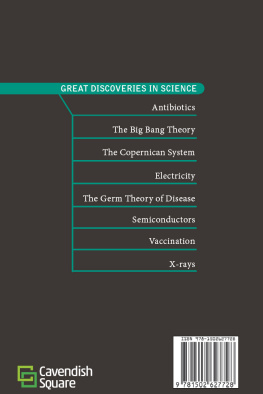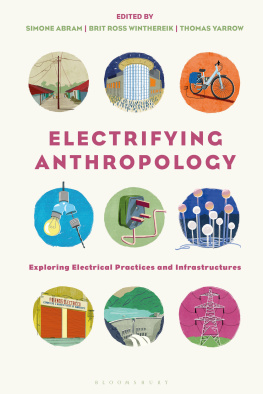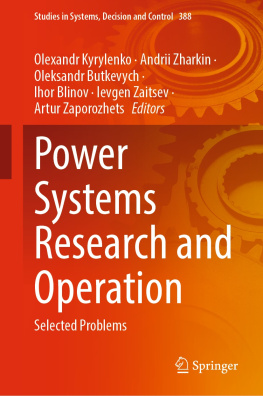THE CURRENT ECONOMY
ELECTRICITY MARKETS AND TECHNO-ECONOMICS
CANAY ZDEN-SCHILLING
STANFORD UNIVERSITY PRESS
STANFORD, CALIFORNIA
Stanford University Press
Stanford, California
2021 by the Board of Trustees of the Leland Stanford Junior University.
All rights reserved.
No part of this book may be reproduced or transmitted in any form or by any means, electronic or mechanical, including photocopying and recording, or in any information storage or retrieval system without the prior written permission of Stanford University Press.
Printed in the United States of America on acid-free, archival-quality paper
Library of Congress Cataloging-in-Publication Data
Names: zden-Schilling, Canay, author.
Title: The current economy : electricity markets and techno-economics / Canay zden-Schilling.
Description: Stanford, California : Stanford University Press, 2021. | Includes bibliographical references and index.
Identifiers: LCCN 2020047026 (print) | LCCN 2020047027 (ebook) | ISBN 9781503612273 (cloth) | ISBN 9781503628212 (paperback) | ISBN 9781503628229 (ebook)
Subjects: LCSH: Electric utilitiesUnited States. | Electric utilitiesSocial aspectsUnited States. | MarketsSocial aspectsUnited States. | ExpertiseEconomic aspectsUnited States. | TechnologyEconomic aspectsUnited States. | Economic anthropologyUnited States.
Classification: LCC HD9685.U5 O85 2021 (print) | LCC HD9685.U5 (ebook) | DDC 333.793/20973dc23
LC record available at https://lccn.loc.gov/2020047026
LC ebook record available at https://lccn.loc.gov/2020047027
Cover design: Andrew Brozyna
FOR TOM
CONTENTS
ACKNOWLEDGMENTS
I began to explore the ideas that would become The Current Economy at the Massachusetts Institute of Technology in the Program in History, Anthropology, and Science, Technology and Society, where I was a doctoral student. During my time at what is affectionately known as HASTS, I had the opportunity to work with exceptional mentors. Over the years, Mike Fischers mentorship has broadened my horizons in countless ways and given me models of scholarly thinking that I can only hope to emulate. I am endlessly grateful to Stefan Helmreich for tirelessly sharpening my ruminations into arguments and encouraging me to be a better thinker. From Susan Silbey, I have learned the methods of scholarly pursuit. Finally, since my first days in graduate school at New York University, Tim Mitchell has inspired me to feed my curiosity into the questions that matter. Among the affiliates of HASTS, I have been grateful to the reading, support, and encouragement of David Kaiser, Heather Paxson, Harriet Ritvo, Chris Walley, and Susann Wilkinson. Karen Gardners friendship was as indispensable as her guidance in navigating administrative waters.
At MIT and in greater Cambridge, I had the distinction of having the loveliest friends one could hope to have in graduate school. Shreeharsh Kelkar manages to bring fun and joy to every day. Shira Shmuely will forever be my sister. Ashawari Chaudhuri and Lucas Mller have been steady sources of understanding and kindness. Amah Edoh and Marie Burks know how much I relied on them during my Cambridge years. A larger group of fellow graduate students knew when my research needed one more citation and/or one more beer. In HASTS past and present, they include Orkideh Behrouzan, Rene Blackburn, Kieran Downes, Xaq Frohlich, Amy Johnson, Clare Kim, Grace Kim, Nicole Labruto, Crystal Lee, Jia Hui Lee, Lan Li, Xi Emily Lin, Lisa Messeri, Teasel Muir-Harmony, Peter Oviatt, Luisa Reis Castro, Beth Semel, David Singerman, Ellan Spero, Mitali Thakor, Michaela Thompson, Nate Deshmukh Towery, and Ben Wilson. Beyond HASTS, Asl Arpak, Ekin Kurti, Andy Rosing and Stephen Tapscott, Aytu amaz, and Mengqi Wang made Cambridge a better place.
The research that went into this book was made possible thanks to many generous people. I thank the market analysts, traders, engineers, market participants, and citizen activists who brought markets to life for me in long conversations. I would like to particularly thank Marija Ili and her team for hosting and humoring me in Pittsburgh. My activist friends in West Virginia and Illinois gave me new critical thinking skills and taught me to have fun along the way. I am endlessly excited about future conversations with them. Financial support for the research was provided by the Wenner-Gren Foundation for Anthropological Research.
Over the years, I have been fortunate to be able to develop and share the key arguments of this book with excellent audiences by way of invited lectures, workshops, and journal pages. I am especially grateful to Simone Abram, Hayal Akarsu, Andrea Ballestero, Dominic Boyer, Stephen Collier, Elizabeth Ferry, Stephanie Friede, Gke Gnel, Sheila Jasanoff, Leksa Lee, Miriam Posner, Antina von Schnitzler, Brit Ross Winthereik, and Caitlin Zaloom. Among the audiences to which I had the chance to present my research, I would like to particularly acknowledge the Department of Sociology at the National University of Singapore, which I am thrilled to join soon as faculty. At Stanford University Press, it was a privilege to work with Michelle Lipinski and Margo Irvin. I am humbled by the incredibly productive and generous reviews by the anonymous reviewers. Needless to say, all of this books errors are mine.
draws on the following, previously published article: The Infrastructure of Markets: From Electric Power to Electronic Data. Economic Anthropology 3 (1): 6880. Published Wiley-Blackwell, 2016 American Anthropological Association. Parts of the following article are reproduced in the Introduction: Economy Electric. Cultural Anthropology 30 (4): 578588. Published Wiley-Blackwell, 2015 American Anthropological Association.
This book was written in Baltimore during a postdoctoral fellowship at Johns Hopkins University. At Hopkins, I had the invaluable opportunity to work with three outstanding scholars as part of an invigorating Sawyer Seminar, Precision and Uncertainty in a World of Data. Naveeda Khans intellectual strength, enthusiasm, and much-appreciated humor continue to be irreplaceable. I will forever cherish the modes of responsible and caring scholarship I have learned from Veena Das, as well as her support and warmth. Jeremy Greene, in addition to inspiring me with his prolific scholarship (and prolific running), has gifted me the title of this book. All four of us and the Seminar were kept afloat by Sam Gomess expert administrative assistance. For making the Anthropology Department a welcoming place, I would like to also extend my gratitude to Alessandro Angelini, Michael Degani, Niloofar Haeri, Clara Han, Nicole Labruto, Anand Pandian, Deborah Poole, and Valeria Procupez. During the final stage of revisions, writing sessions with Hayal Akarsu and Shreeharsh Kelkar were a critical source of camaraderie and sustenance.
In Baltimore, many friends have tremendously contributed to this book by letting me drone on about academic minutiae and giving me plenty of reasons to look forward to breaks. In particular, I am grateful to Maggie Epps, Nicole Aranda, and their families, for making Baltimore home. I cant wait to raise our families together and support each other through the good, the bad, and the pandemic.
My parents, Aytl and Ercan zden, have always had the unwarranted conviction that I knew what I was doing with my life. I have always relied on their unconditional trust, and for that, I am thankful. Over the years, my nuclear family grew to include wonderful new people. I thank the extended Schilling clan for being so fun to hang out with and so reassuring a presence. My gratitude goes particularly to Gail Schilling, who taught my son about flowers while I was racing this book to the finish line.










